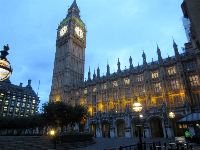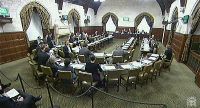They have been debating the Syria bombing in the House of Commons over the last two days. This is Parliament’s page on the 2nd day of debates which is based on a motion put by Alice McGovern MP (Labour). Jeremy Corbyn instructed Labour to vote against, spoke against it and the debate is recorded in Hansard here, together with the voting record. The previous day, the Prime Minister made a statement to the house, the web page with links to the video and Hansard record is here…. I watched a couple of hours; it’s dispiriting stuff, the PM makes every other speech, and half the remainder are Tories and Labour’s Refusniks were out in force.
Here’s how the argument goes, the use of chemical weapons is a humanitarian crime, despite the fact that the two organisations responsible had not determined that such an attack had taken place, nor that military force was to be used, the Governments of the USA, France & the UK had decided that bombing targets in Syria was an appropriate & legal response.
Only the British Government has published its legal reasoning. They argue that Sovereigns have the right to make humanitarian interventions without permission from the UN. That would require the act of a chemical attack to have occurred and the western power’s action to have reduced the likelihood of further attacks.
The right to make such humanitarian interventions is controversial and has never been agreed by the UN nor any international court. The attack has not been confirmed by the international body designated as responsible, and it’s highly questionable if the actions will improve the lot of the Syrian people. This is why the claim to have degraded the chemical warfare capability of the Syrian Government is so important. Otherwise its just recreational!
The argument that the UN had failed to act because Russia was cheating does not give the Governments of the USA, UK & France the right to substitute their judgement for that of the Security Council. As Dapo Akande argues in his legal opinion for Tom Watson, if nothing else there’s always the UN’s Uniting for Peace process which is designed to deal with a deadlocked Security Council. The UN flawed as it is, is our only hope. The three governments have weakened its authority. A further option was as Corbyn says, to support the OPCW and continue to pressurise Russia by diplomatic means. …







